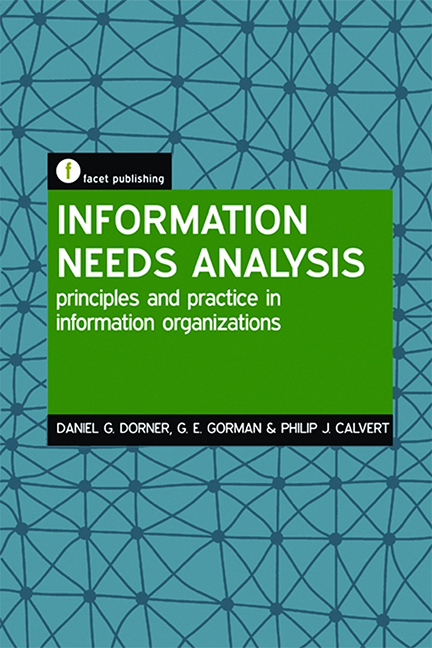Book contents
- Frontmatter
- Contents
- List of figures and tables
- List of scenarios
- About the authors
- Preface
- 1 Background to needs analysis for information managers
- 2 The importance of context in information needs analysis
- 3 Models and types of information needs analysis
- 4 The stages of information needs analysis
- 5 Gathering data for information needs analyses
- 6 Gathering data from existing sources
- 7 Gathering data through surveys
- 8 Gathering data through interviews
- 9 Analysing and integrating information needs analysis data
- 10 Reporting on an information needs analysis
- Bibliography
- Index
10 - Reporting on an information needs analysis
Published online by Cambridge University Press: 10 September 2022
- Frontmatter
- Contents
- List of figures and tables
- List of scenarios
- About the authors
- Preface
- 1 Background to needs analysis for information managers
- 2 The importance of context in information needs analysis
- 3 Models and types of information needs analysis
- 4 The stages of information needs analysis
- 5 Gathering data for information needs analyses
- 6 Gathering data from existing sources
- 7 Gathering data through surveys
- 8 Gathering data through interviews
- 9 Analysing and integrating information needs analysis data
- 10 Reporting on an information needs analysis
- Bibliography
- Index
Summary
Introduction
We are now at the end of the process, both figuratively and literally. In this final chapter of the book we examine the last stage of an INA process – reporting the results. There is no single way to write such a report, so our comments here must be viewed as suggestions rather than specifications. Each INA will have a unique purpose and context, and there may well be organizational requirements for formatting or target audience expectations for terminology that prescribe aspects of the written project report. Therefore, it is best to clarify those prior to putting fingers to keyboard.
For some INA projects the requirements will be spelled out clearly, for example when the investigator has a contract containing specifications for the work. The contract might include instructions on the nature and extent of the final report and specify all the topics/problems that must be addressed and a maximum word length.
INAs can be presented in written format and/or verbally, so both are covered in this chapter, the majority of which concentrates on the formal report written at the end of the analysis. Other short sections discuss the use of draft reports, oral presentations and less conventional means of communicating findings to the stakeholders.
In Chapter 4 we stated that reporting the results is Stage 4, that is, the final stage, of the INA process, coming after preparation, data gathering and data analysis (see Figure 4.1, p. 68). At the reporting stage the investigator presents a review of the investigation's findings and seeks to determine a range of likely cause-and-effect relationships. On the basis of these relationships a range of possible interventions might be suggested to address the needs that the analysis has highlighted or exposed. That is, the recommendation of a set of possible context-specific solutions is articulated in the report. Thus one purpose of a report is to present the findings; another is to serve as a permanent record of the analysis.
Regardless of whether the INA has been requested internally or commissioned by an external body, it has been requested because someone believes that some sort of a problem exists.
- Type
- Chapter
- Information
- Information Needs AnalysisPrinciples and Practice in Information Organizations, pp. 219 - 246Publisher: FacetPrint publication year: 2017



